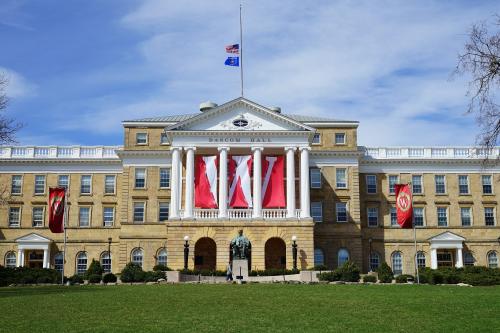As the Biden administration attempts to reforge global alliances and reanimate U.S. leadership of the international community, one place to begin that work is, surprisingly, right here in the American Rust Belt.
This work involves helping our leaders identify and animate policies, practices, and strategies that accelerate economic success for the Midwest’s older industrial regions. These are the geopolitically significant places where many residents feel alienated and left behind—conditions that create fertile ground for the nativism, nationalism, isolationism, and economic nostalgia that empower populist leaders and nurture the fierce political polarization that is undermining Western democracies. These forces won’t be overcome until their root conditions are treated.
There is a growing body of evidence demonstrating that when older industrial communities continue in decline, residents are receptive to the polarizing messages of populists and nativists. Conversely, we are beginning to see examples that show when former Rust Belt communities do secure new economic footing, the lure of populism wanes.
This has been the case recently in the American Midwest swing states, where residents of former Rust Belt regions that have made the transition to a new economy exhibit different attitudes and voting patterns than communities that still struggle. In regions anchored by resurgent industrial communities such as Pittsburgh and Grand Rapids, Mich.—as well as a number of smaller Midwest former industrial communities that have turned an economic corner—we observe powerful trends away from nationalism and nostalgia and toward moderate centrism. This was true in both the 2018 U.S. midterm elections and in the November 2020 presidential election.
We also observe this phenomenon in Europe. For example, in Duisburg, Germany—which is at the heart of the once-mighty Ruhr coal and steel region and home to a successful effort to rebuild the local economy around microelectronics—the far-right AfD party underperformed in the 2017 national elections relative to the regional average. In France’s 2017 presidential election, far-right candidate Marine Le Pen carried nine of the 10 French departments with the highest unemployment rates; however, former industrial cities such as Lyon and Strasbourg that have navigated economic change supported the more moderate and ultimately successful party led by Emmanuel Macron. In the United Kingdom’s Brexit referendum, recovering manufacturing centers such as Leeds, Manchester, and Newcastle upon Tyne voted to remain in the European Union, while struggling communities such as Rotherham, Wolverhampton, and Blackpool overwhelmingly voted to leave.
President Joe Biden and his counterparts in Europe need to focus on creating the conditions for economic success in their still-transitioning Rust Belt regions. But how to best go about it? After the 2016 U.S. presidential election, Jared Bernstein, who served as an adviser to then-Vice President Biden, wrote, “Yes, the Rust Belt demands an answer. But does anyone know what it is?” Five years on and we still confront the same question.
Economists and analysts generally converge on some of the more important policy levers to pull, particularly at the federal level: investing in people, education and skill-building. The same goes for infrastructure, including essential high-speed internet access for every person and community. Leaders should fund basic and applied research and innovation that drive new technology creation, jobs, and business growth in emerging sectors, from IT to health care to clean energy. They should also provide decent employment security and a social welfare safety net.
Perhaps the most important solutions to economic decline and its populist offspring are right in front of us at the local and regional level. Lifting up and sharing the successful paths that many formerly industrial communities have already taken to find new economic success across the Atlantic can be done right now, and is the text of our work.
Given that there are industrial communities throughout North America and Europe that have succeeded at leveraging the economic assets they have to implement policies and strategies to drive economic regeneration, we have a host of practical case studies that illuminate the paths to success for older industrial towns, cities, and regions.
- Sheffield, U.K.—an Advanced Manufacturing Research Centre built as a partnership between the University of Sheffield and leading employers—is using the region’s steel-making heritage to forge a new future in advanced manufacturing, including partnerships with Boeing, Rolls-Royce, and McLaren. It also supports these firms’ local suppliers via an extensive apprenticeship program and a wide range of demonstration facilities.
- Ontario, Canada’s Waterloo-Kitchener and London regions—once traditional manufacturing centers—are now centers of innovation and business growth in emerging sectors. Meanwhile, manufacturing-heavy Windsor, Ontario is animating a new economic development strategic plan with support from the U.K.
- In Germany, long-standing federal and local attention to planning and managing economic structural change in the industrial Ruhr Valley is beginning to pay off. Some communities have begun a successful transition of enterprises, workers, and communities to a new economy. Cities such as Essen and Dortmund have migrated successfully from reliance on coal and steel.
- Across the U.S. Midwest—as seen in a recent Chicago Council on Global Affairs report—dozens of communities have shed their old industrial skins and are thriving anew in the globalized economy. Some are cities that are succeeding as their anchor employers stay on the cutting edge of innovation in emerging sectors, such as Columbus, Ind., Midland, Mich., and Rochester, Minn. Others—such as Rockford, Ill., and Troy, Mich.—grow by engaging economically and socially with the world, selling to global markets, and welcoming immigrant talent and new populations. Grand Rapids, Mich., Adair County, Iowa, and Milwaukee are rebooting their economies and reinvigorating their communities through leadership in the sustainable “green” and “blue” economies of tomorrow, creating new jobs in clean energy and smart-water technologies. And Kalamazoo, Mich., and Georgetown, Ky. have found new success by marking themselves as committed to talent, skill-building, and education.
These examples from North America and Europe illustrate that the transition from “old” economy to a thriving “new” one can and is being made, often driven by effective local public-private leadership. What are the implications for current federal policy? In the U.S., the Biden administration would be well served to quickly pass the Endless Frontier Act modeled on Brookings Metro’s “growth centers” proposal to support development of noncoastal tech hubs. A national place-based federal block grant program focused on distressed communities, as proposed by the W.E. Upjohn Institute’s Timothy J. Bartik and embraced by the New Democrat Coalition, would lift both older industrial communities and rural Americans most in need of support in a cost-effective way. We’ve also proposed a “GI Bill for workers” to directly support the skills transition urgently needed by workers dislocated by globalization and COVID-19-accelerated automation.
In the U.K., current government efforts to revitalize similar communities in the Midlands and the North of England should also begin with increased funding for applied research and technical skills training developed through partnerships between local colleges and universities, as proposed by the Centre for Cities. Government should also look to rebuild industrial and manufacturing capacity through its ambitions for more resilient supply chains, such as those for vaccines, medical equipment, and defense, as recommended by the University of Cambridge’s Bennett Institute. Finally, instead of a series of one-off bidding competitions, the government should take the advice of the Bank of England’s Andy Haldane and focus on long-term stability and the strengthening of key local institutions, including councils, colleges, and cultural organizations.
There is a real urgency to this work. Unless local and federal leaders in Western nations focus on and accelerate economic success for people and places where residents feel alienated and left behind, polarizing populist politics will continue to undermine both our alliances and our democracies.
Colleen Dougherty, Alex Hitch, and Jack Farrell contributed to this article.
A version of this article was also published by the Chicago Council on Global Affairs.








Commentary
To counter extreme politics, revive global democracies’ Rust Belts
April 8, 2021